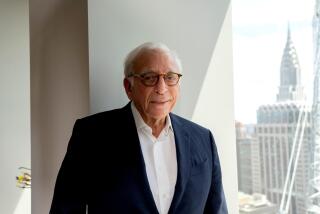Pressure Stays on Tellep to Tackle Lockheed Troubles
- Share via
There has been no honeymoon period for Daniel M. Tellep since he became chairman and chief executive of Lockheed Corp. at the start of this year.
The aerospace giant, rocked by $465 million of earnings writeoffs in development contracts, may wind up in the red this year. And Lockheed has been menaced most of the year by the threat of a takeover by Texas investor Harold Simmons.
But analysts say Tellep, a low-key 34-year employee of Lockheed, should not be blamed for the company’s problems.
“Tellep has had a rough year,” said Lawrence Harris, an analyst with Bateman Eichler, Hill Richards. “I don’t think anyone could have expected all this to have happened within such a short time.”
“The losses this year do not reflect Tellep’s performance so far,” Harris said.
Analyst Paul Nisbet of Prudential-Bache Securities said Tellep appears to be proceeding conservatively in the face of an uncertain future, the result of growing support for defense spending cutbacks.
“Tellep has followed a path that makes a great deal of sense so far,” he said. “I think people may be underestimating him.”
“Tellep is not gregarious but he definitely is very knowledgeable about the military business,” Nisbet said.
The pressure has been on Tellep, who just turned 58, since he succeeded Lawrence Kitchen as head of Lockheed on Jan. 1. In early April, Simmons disclosed that he had acquired a 5.3% stake in Lockheed, which had long been mentioned as a takeover target because its shares were undervalued.
On the following day, Tellep announced a sweeping restructuring that included formation of a $500-million employee stock ownership plan and the decision to sell off its Information Systems Group and some real estate.
Simmons announced this week that he was boosting his stake to at least 15% from 10.6%.
In the meantime, Lockheed’s earnings have been hit hard by writeoffs on fixed-price development contracts, which have become a major headache for the defense industry.
Tellep announced last week that the company would take a $300-million charge against fourth-quarter earnings because of cost overruns on a $600-million Navy contract for the P-7A anti-submarine warfare plane.
“The competitive nature of the defense business has forced contractors like Lockheed to underprice competitors and be far too optimistic,” Nisbet said. “It’s a real crap shoot.”
Tellep also disclosed last month, as part of an announcement about a $165-million writeoff for other fixed-price development contracts, that the company would no longer compete for such contracts.
Northrop Corp., which is competing with Lockheed for the 1991 award of the Air Force’s Advanced Tactical Fighter, announced a similar decision last year.
Nisbet said Tellep’s decision is probably the key one made by Tellep so far, since it conceded an advantage Lockheed had in the bidding for the ATF contract to build the next generation of U.S. fighter planes, expected to total about $75 billion.
“Lockheed’s action took Northrop off the hook,” Nisbet said. “It took away the advantage, but agreeing to a fixed-price ATF contract would have been betting the very existence of the company.”
Tellep joined Lockheed in 1955 as a missile scientist and became president of its Missiles & Space Systems Co. in 1984. Harris gives him high marks for building up that part of Lockheed into one of its best performing divisions, both in terms of growth and earnings.
Harris said he remains optimistic that Lockheed will be able to post solid earnings in 1990 and 1991.
“I think that Tellep is very capable of leading the company through what is going to be a highly uncertain environment,” he said.
More to Read
Inside the business of entertainment
The Wide Shot brings you news, analysis and insights on everything from streaming wars to production — and what it all means for the future.
You may occasionally receive promotional content from the Los Angeles Times.










